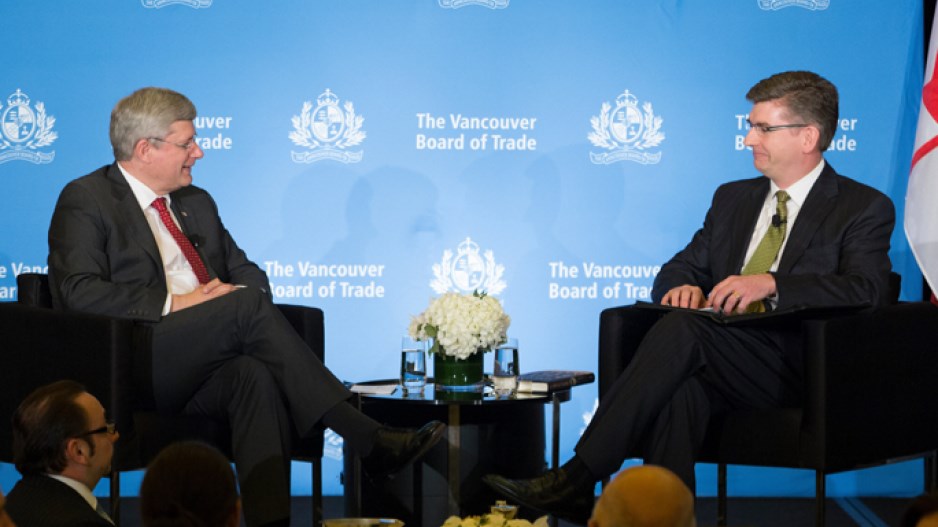Prime Minister Stephen Harper pushed pipelines and trade deals during an address to the Vancouver Board of Trade on January 6.
In particular, a trade agreement recently signed with the European Union has the potential to help Canada diversify away from its traditional reliance on the United States, Harper said.
The agreement opens up tariff-free trade between the two entities on a wide range of products and services, and is the biggest trade deal Canada has signed since ratifying the North America Free Trade Agreement in 1992.
“[Europe] is the biggest integrated market in the world,” he said. “Notwithstanding the challenges it has, it’s still the wealthiest single market in the world.”
The deal would not have been reached without the involvement of Canada’s provinces and territories, Harper said, because Europe was seeking access to bid on municipal and provincial government infrastructure projects.
“The federal government could not negotiate that on its own,” he said.
The Canadian government is currently working on trade deals with South Korea and India as well as the Trans Pacific Partnership, a sweeping agreement that involves 12 countries throughout the Americas and Asia.
“Hopefully this is the beginning of even bigger things to come,” Harper said of the European Union deal. “It was an essential step, breaking out of a trade pattern that was just North America-focused.”
The start of Harper’s talk was briefly interrupted by two protesters seemingly dressed as waiters who walked on stage and held signs reading “Climate Justice Now” before being hustled away by security. A group of around 10 protestors, many beating drums, gathered outside the downtown Vancouver hotel where the talk took place and heckled attendees as they left the event.
Harper said his government has yet to make a decision on the contentious Northern Gateway pipeline, which would carry oil from Alberta to B.C.’s northern coast before being shipped to Asia.
“We have a process of an environmental review, the NEB and other environmental reviews,” he said. “The government will follow that process and make appropriate decisions as it always has.”
On December 19, the National Energy Board recommended that federal cabinet approve the project as long as 209 conditions were met.
The project is stridently opposed by environmental groups and First Nations, who fear the consequences of a potential oil spill or tanker disaster.
Two separate reports — one provincial, one federal — have identified gaps in the ability to respond quickly to a marine oil spill on B.C.’s coast.
“Our government has committed to making sure that we have a rigourous system of pipeline safety, a rigourous system of marine protection and that we fully respect our constitutional duty to consult with aboriginal communities,” Harper said.
He also said it was in the national interest to find markets other than the United States for Canada’s oil, and expressed hope that the American government would approve the controversial Keystone pipeline.
New oil finds in areas such as North Dakota’s Bakken formation have decreased the price of oil and have made the U.S. more reliant on its own reserves.
When it comes to relations with First Nations in B.C., Harper said he hopes that aboriginal leaders and communities will consider the economic benefits of natural resource projects.
“If handled properly, this is an opportunity for First Nations and their communities to join the mainstream of the Canadian economy,” he said, “without which in my judgment we won’t make progress on … the social issues, we need to make progress on in those communities.”
Citing B.C.’s proximity to Asia, Harper said the federal government would make more infrastructure investments in B.C.’s Pacific Gateway shipping and trucking system, but declined to reveal details.
“This is where we want to make those substantial investments necessary to take advantage of all the … resource and other growth opportunities,” he said.
With the United States and Europe showing stronger economic performance, Harper said he was more optimistic about Canada’s economy than he was one year ago. But he warned an uncertain global economy is still Canada’s biggest challenge.
He echoed comments recently made by Finance Minister Jim Flaherty that his government will present a balanced budget by 2015, the same year a federal election is scheduled to take place.




